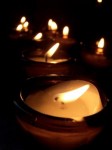 In the shadows of the showy Beaux Arts Cathedral, I rose from a worn kneeler and turned back to contemplate the almost mystical glow of the votive stand. The small flames of the two candles I’d lit for my mother, the flickering pluck of them, the tiny shadows on the amber glass. I felt a pang noticing that they had grown discernibly shorter. I had set one wick burning for my mother, and then a second, lit from the first, for the daughter she had birthed and had now left grieving—for the essential truth that I was hers; for all of her that lived in me. On impulse, I tipped a match to the second candle and lit a third flame on an adjacent votive stand (another dollar in the box). A light that was made possible by the first two, I thought. One that would burn on. I knew the symbolism was simple and soft, even a little mawkish. But I indulged myself. My mother to me. My mother and me to this third symbolic flame.
In the shadows of the showy Beaux Arts Cathedral, I rose from a worn kneeler and turned back to contemplate the almost mystical glow of the votive stand. The small flames of the two candles I’d lit for my mother, the flickering pluck of them, the tiny shadows on the amber glass. I felt a pang noticing that they had grown discernibly shorter. I had set one wick burning for my mother, and then a second, lit from the first, for the daughter she had birthed and had now left grieving—for the essential truth that I was hers; for all of her that lived in me. On impulse, I tipped a match to the second candle and lit a third flame on an adjacent votive stand (another dollar in the box). A light that was made possible by the first two, I thought. One that would burn on. I knew the symbolism was simple and soft, even a little mawkish. But I indulged myself. My mother to me. My mother and me to this third symbolic flame.
Leaving the alcove–and that strangely moving statue of the Virgin Mary in young-mom mode–I set out into the baroque colossus of the cathedral, walking like a cat to mute the slapping reverb of my heels on the marble floor. The ornate and slighly culty grandeur of the place! The ornamented pilasters and balustrades; the bric a brac gone wild; the soaring stained-glass windows depicting martyrs in the throes of assorted agonies; the seas of burnished pews, vacant, weary, in shafts of late-afternoon sunlight; the metallic echoes of a few people—tourists and pilgrims—murmuring or praying softly. Granite columns, each as big as my bathroom; shrines tricked out in gold leaf; angels, saints, and the Holy Spirit gazing out of enormous dark canvasses. Front and center, a mammoth altar of black and gold marble, festooned with bronze latticework.
The overall effect seemed intended to leave no room for the human or the intimate. Perhaps it was meant to quash the faithful into awed submission by sheer granite and gold-leaf overwhelm. Still, I crept on. Here was another set of votive candles, an alcove devoted to St. Joseph. Here was an enormous padded chair, or throne, designated for the archbishop. Here was what had to be one of the world’s most towering organs, here a giant fresco featuring an eminence of some sort—an early-century Cardinal? Here, jarringly, was a rack with pamphlets —how to give money to restore a fresco or an arch, how to book a wedding or a funeral, how to support crusades against same-sex marriage and women’s right to choose. I paused, my blood stirring: had the brush with rightist Vatican morality campaigns pulled me out of my grief? But then I came to a series of alcoves announced, via wall plaque, as an international gallery of time’s most celebrated saints: Italy’s St. Anthony of Padua, Ireland’s St. Patrick, Russia’s St. Cyril, Germany’s St. Boniface, and a parade of others.
I stopped at France’s St. Therese of the Little Flower. My mother had a soft spot for St. Therese, I remembered. Her own mother had the same birthday as this French saint, and as my grandmother’s Catholic devotion deepened late in her life, she took to including in her daily Novenas special rosary-aided entreaties to St. Therese. She spent the last 12 years of her life—years 90 to 102, the sorry Alzheimer years—in a well-appointed nursing home that, as it happened, was named for the Little Flower.
Long before that, though, the fables of this early 20th-century French nun’s childlike simplicity, and the roses that rained when she died, had captured my mother’s imagination. She had kept from her own childhood a dog-eared storybook—from which she read to me—telling of the the marvelous things that might happen, flowers raining down, in a life modeled on Therese’s: honest and loving and faithful.
 No roses had rained for my mother, though. And none rained that day for me; even poised wet-eyed before the statue of St. Therese, I didn’t find my mother. “That isn’t surprising,” Melody observed when I told her about it. “You said your mother wasn’t especially religious.” That was true; the observant Catholic mother of my early childhood had drifted; I’d always suspected that the mettle of my mother’s faith had gone when neither her prayers nor her beloved brother’s abundant goodness had spared him from a deadly brain tumor at 60. Her attendance at mass had become erratic; she was all but unchurched except for occasional pilgrimmages to the renegade, social justice-y, flutes-and-guitars church in the center of the city. She’d had little interest in my offers to take her to mass, have a priest come to call. But she’d taken the trouble to write “Roman Catholic” on her living-will form.
No roses had rained for my mother, though. And none rained that day for me; even poised wet-eyed before the statue of St. Therese, I didn’t find my mother. “That isn’t surprising,” Melody observed when I told her about it. “You said your mother wasn’t especially religious.” That was true; the observant Catholic mother of my early childhood had drifted; I’d always suspected that the mettle of my mother’s faith had gone when neither her prayers nor her beloved brother’s abundant goodness had spared him from a deadly brain tumor at 60. Her attendance at mass had become erratic; she was all but unchurched except for occasional pilgrimmages to the renegade, social justice-y, flutes-and-guitars church in the center of the city. She’d had little interest in my offers to take her to mass, have a priest come to call. But she’d taken the trouble to write “Roman Catholic” on her living-will form.
There was also, Melody gently reminded me, the age-old truism of the elusiveness of what is actively searched for: Things come to you when you least expect it.
This was true of my visitation (for lack of a better word) from my mother, who came to me suddenly and quietly late one night as I was about to get out of the car outside my garage. I think constantly about this remarkable event; I need to write about it, and will.
But where is my mother now? I keep searching. I am unable not to.
And yet. Melody’s comforting metaphysics—all those intriguing quarks and vibrations, that pleasingly chi-like universal sea of energy—notwithstanding, I am also continually caught up short by the overwhelming feeling of utter loss, of a breathtaking finality. My mother was here in her life just weeks ago. She was here for nearly 85 years and now she isn’t. I poured a glass of wine tonight and was pierced to the core thinking of her … seeing her pouring her evening juice glass of Inglenook and spreading cheese on a few Pepperidge Farm butter crackers. The pleasure she took from it. The deep and inalterable truth of her no longer eating a cracker or coming to the phone.
And all of what I knew of my mother—what of it now? My mind brims, still, with all that I knew of the complex mosaic of my mother—that she loved Barbara Pym the novelist and orange Pim cookies, for instance. That she reserved the best spots in her garden for cosmos and nasturtium, possessed a peculiar fondness for “old man of the sea” knickknacks common in surfside souvenir shops, had been a favorite of all the barn cats on her Uncle Henry’s farm, had a finger that ached when it rained from a long-ago flattening in a doorlatch, preferred Tony Bennett to Frank Sinatra, had harbored a secret hankering to write, had saved in a box to the end of her life her baby shoes and her report cards and a Marx tin windup orchestra she’d adored as a child. All that I knew and took for granted … the thousands or millions of small shards of mom strewn casually or deeply in every corner of my memory—all of this was suddenly, wrenchingly, abstract, past tense, ephemera—trivia—from a house that no longer stood.
The candles are out. Perhaps it is true that, to paraphrase a 13th-century mystic, I was using a candle to look for the sun. But what I felt at that moment was that all that my mother was—the chapters and verses of her, the music of her, the singularity of her, the history of her, the petite plaid bent smiling person of her, the woman once a girl of her—is no longer on the earth. Not as my mother and not as a person. Not as she was.

I’ve read every word, every jot, and felt every beat of your throbbing and aching heart, and I’m undone. It’s utterly, breathtakingly beautiful, uplifting, sorrowing, searing, soaring, lovely and sad and transcendent. It’s a gift to the entire world of women in the throes of, or at the front end of, or anticipating, or remembering, mother-loss–in other words, all women at mid-life and younger and older. And it’s a gift to all of the mute, blocked writerly women waiting to be unleashed. I’ll read every word again, and again, remembering you, your mother, my own mother, even the still, graceful, granite mother whom I’ve never known or prayed to, but who has inspired so much poetry in you.